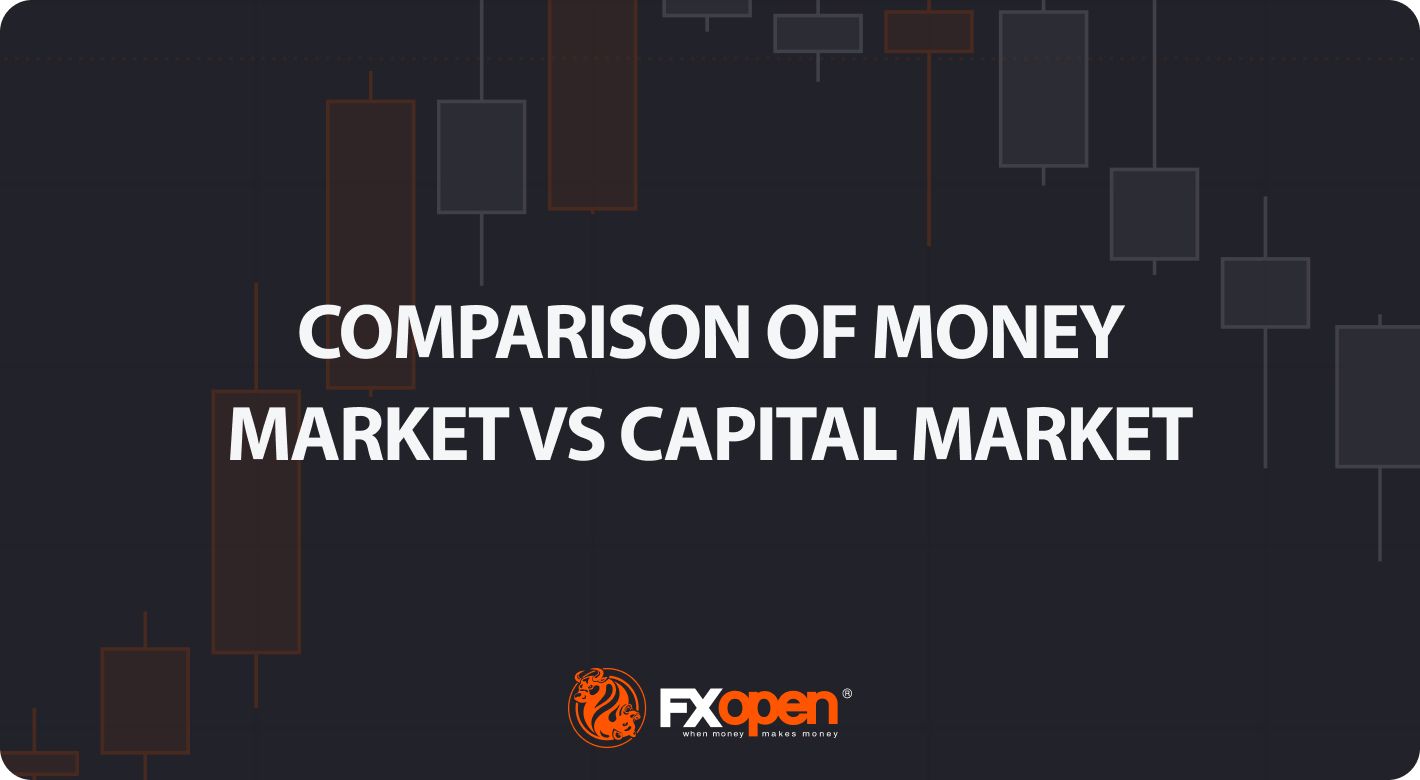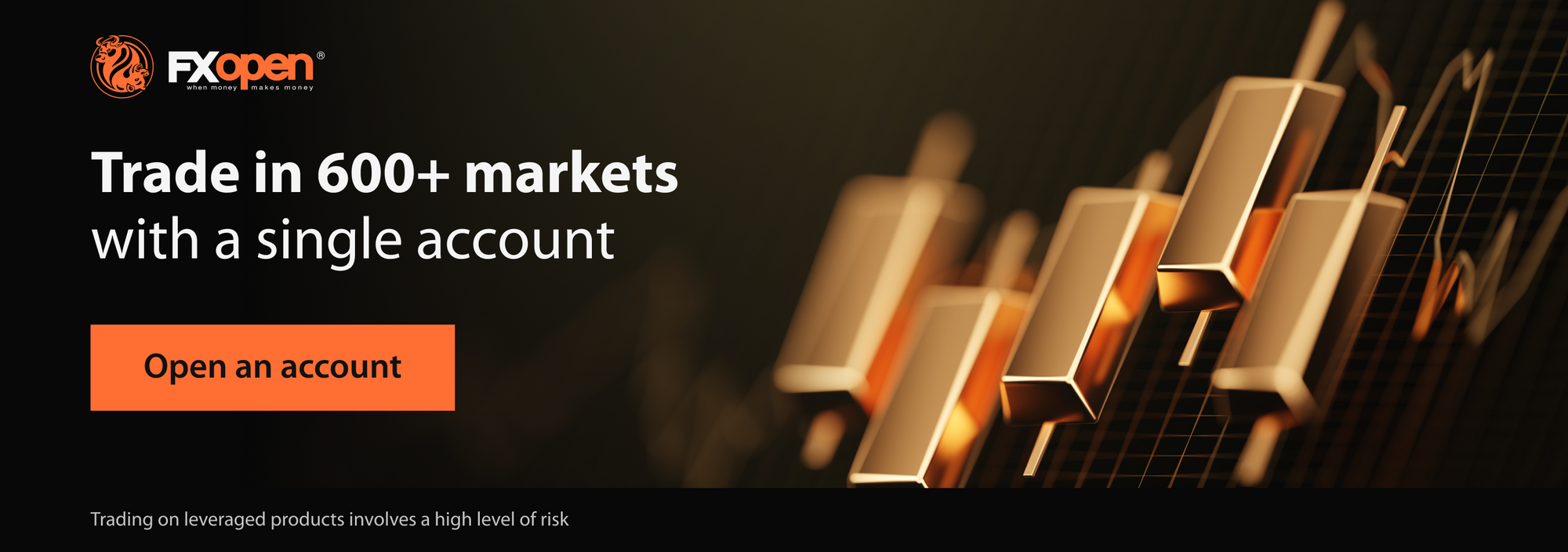FXOpen

Navigating the financial world requires a clear understanding of its various facets, especially when comparing the money market vs the capital market. These two pivotal markets serve distinct roles in the economy, catering to different investment horizons and risk profiles. This article aims to demystify these markets, providing insights into their characteristics, differences, and the importance they hold for traders and investors alike.
What Is the Money Market?
The money market involves trading short-term financial instruments. It’s characterised by high liquidity and low risk, making it a popular choice when it comes to managing short-term financial needs and cash reserves.
Instruments traded here include Treasury bills (T-bills), which are government-issued securities with maturities of less than one year. Commercial paper, another common instrument, is an unsecured, short-term debt issued by corporations to finance their immediate operational needs. Additionally, certificates of deposit (CDs) issued by banks offer fixed interest rates for short-term deposits.
These instruments collectively may provide a safe haven when investors seek stability and quick access to their funds, with minimal exposure to price fluctuations.
What Is the Capital Market?
The capital market is a financial marketplace where long-term debt and equity-based securities are traded. It's essential for raising capital and serves as a key platform for long-term investment and wealth generation.
It includes stocks, representing ownership shares in companies, and bonds, which are debt securities issued by entities like governments and corporations. Stocks offer potentially higher returns but come with greater risk, while bonds provide a more stable income stream but usually with lower returns.
This market plays a crucial role in the economy by enabling capital formation and investment in productive ventures, driving economic growth. It attracts investors seeking opportunities to invest in the future growth of companies, infrastructure projects, and governmental initiatives, offering a range of options from high-risk, high-reward stocks to more conservative bonds.

Key Differences Between Money vs Capital Markets
In the financial world, understanding the key differences between capital market securities vs money market securities is crucial for investors and traders. While both are integral parts of the financial system, they serve different purposes and offer distinct characteristics.
Money Market
- Investment Duration: Characterised by investments typically lasting under a year, designed to meet immediate liquidity requirements.
- Risk Profile: Offers potentially lower-risk options with relatively stable returns, ideal for conservative investors.
- Types of Securities: Features instruments like Treasury bills, commercial paper, and certificates of deposit for quick cash conversion.
- Role in the Economy: Provides essential short-term financial effectiveness and efficient liquidity management.
- Liquidity: Instruments in this market are highly liquid, facilitating fast and easy access to funds.
Capital Market
- Investment Duration: Focuses on the long-term, often spanning years or decades, aimed at future growth and capital accumulation.
- Risk Profile: Involves a higher risk attributable to longer time horizons and market volatility, particularly with stocks. You can keep an eye on stock volatility in FXOpen’s free TickTrader platform.
- Types of Securities: Comprises stocks, bonds, and long-term debts, catering to a range of investment preferences.
- Role in the Economy: Plays a crucial role in long-term investment strategies, economic growth, and facilitating capital formation.
- Liquidity: Securities like stocks and bonds offer varying degrees of liquidity, generally less than money market instruments due to their long-term nature.
Importance of Each Market to Traders
The money market is critical for traders seeking stability and short-term liquidity. Its lower-risk instruments, like Treasury bills and certificates of deposit, are ideal for parking surplus funds with a focus on capital preservation. It’s also invaluable in hedging short-term currency or interest rate risks.
On the other hand, the capital market is a key arena for traders aiming to achieve long-term growth and higher returns. Investing in stocks and bonds in the capital market allows traders to participate in the economic growth of companies and governments. While these investments carry higher risk, they offer the potential for greater capital appreciation and income through dividends and interest.
Impact of Economic Changes on Both Markets
Economic changes can significantly impact both the money and capital markets but in different ways. In the money market, interest rate fluctuations are a primary influencer. Lower interest rates typically make short-term investments less attractive, reducing returns on instruments like Treasury bills and certificates of deposit. Conversely, higher rates can increase the appeal of these securities.
In the capital market, broader economic trends play a more substantial role. Economic growth can boost investor confidence, leading to increased demand for stocks and higher market valuations. Inflation can also impact the capital market, as it may erode the real value of fixed-income securities like bonds. However, political stability and policy changes can either enhance or diminish investor confidence in both markets, affecting performance and investment decisions.
The Bottom Line
Understanding the differences between these markets is vital. Each market serves unique purposes, catering to different investor needs, from short-term liquidity in the money market to long-term growth in the capital market. For those looking to explore these opportunities, opening an FXOpen account can provide access to a range of stock and ETF CFDs. Happy trading!
This article represents the opinion of the Companies operating under the FXOpen brand only. It is not to be construed as an offer, solicitation, or recommendation with respect to products and services provided by the Companies operating under the FXOpen brand, nor is it to be considered financial advice.
Stay ahead of the market!
Subscribe now to our mailing list and receive the latest market news and insights delivered directly to your inbox.








